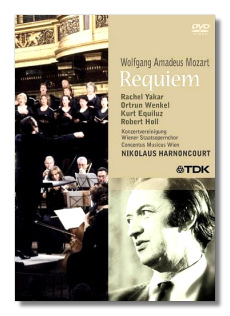
The Internet's Premier Classical Music Source
Related Links
- Latest Reviews
- More Reviews
-
By Composer
-
Collections
DVD & Blu-ray
Books
Concert Reviews
Articles/Interviews
Software
Audio
Search Amazon
Recommended Links
Site News
 DVD Review
DVD Review
Requiem

- Wolfgang Mozart: Requiem (ed. Beyer)
- Johann Sebastian Bach: Cantata "Komm, du süße Todesstunde," BWV 161
Rachel Yakar, soprano
Ortrun Wenkel, alto
Kurt Equiluz, tenor
Robert Holl, bass
Konzertvereinigung Wiener Staatsopernchor
Concentus Musicus Wien/Nikolaus Harnoncourt
TDK DVWW-COMREQ DVD 76 minutes LPCM Stereo Full Screen
In the United States, All Saints' Day (November 1) is not generally observed, but it is more important in Europe… for example, in Vienna, which is where this live broadcast originated on November 1, 1981. The same forces recorded a CD of the Mozart Requiem at about the same time (I assume), but here is this performance's first appearance on DVD.
There are some interesting things going on here. The chorus (the concert incarnation of the Vienna State Opera Chorus) was unused to working with Harnoncourt and with the Concentus Musicus Wien, the period instruments ensemble he and his wife had founded decades earlier, and the tension creates some taut singing. As on his later recording, Harnoncourt's view of Mozart's Requiem is tough and uncompromising – a real day of judgement. Anyone who thinks that Mozart's music is unrelievedly serene or merely pretty will be rudely awakened (both figuratively and literally) by this performance, with its dynamic extremes, bracing timbres, and clipped rhythms. In this performance, one really feels that the four soloists are acting as intercessors on behalf of mankind… that they are gentle voices of pity among the terror and flames. Yakar is angelic in her solos, and Wenkel brings impressive body to the solos for alto. Equiluz's passionate tenor and Holl's strong and clear bass (never woofy) complete a memorably good quartet. The choir is very good, but there are occasional ensemble problems between them and the orchestra. (Is it because the baton-less Harnoncourt conducts on the beat, rather than anticipating it, like many conductors?) Balance between the choir and Concentus Musicus Wien also is not good, but this might be an engineering problem instead of a musical one. Overall, the sound on this DVD (LPCM stereo only) is a little harsh. The camera-work is good except for when it catches choristers or instrumentalists nervously watching the cameras. The image is full-screen
The "bonus" is Bach's 21-minute cantata, which actually came before the Requiem on the same concert program. There are arias for tenor and contralto, two choruses, and a final chorale. One notable feature of this performance is the use of wooden recorders, which make a fragile yet attractive sound.
The absence of subtitles is regrettable not so much in the Mozart, but definitely so in the Bach, because the German text will be unfamiliar to most listeners.
Copyright © 2007, Raymond Tuttle




















